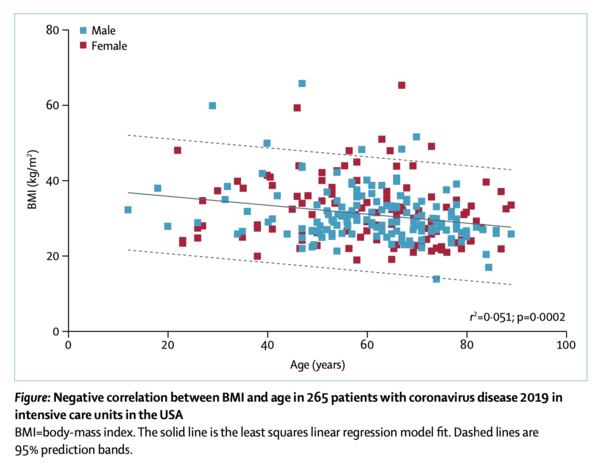(Excerpt)
.... The largest study of 1591 ICU patients from Italy reported a median age of 63 years, with only 203 patients (13%) younger than 51 years. Common comorbidities are hypertension, cardiovascular disease, type 2 diabetes, and, more rarely (42 [4%] of 1043), obstructive pulmonary disease. Similar data have been reported from China.
When the COVID-19 epidemic began in the USA, we anticipated a similar ICU population. News reports and communications from the US Federal Government had emphasised that COVID-19 was a particular problem for older people, and a resistance to social distancing and sheltering in place by younger people might have been informed by this idea. However, as the pandemic hit the Johns Hopkins Hospital in late March, 2020, younger patients began to be admitted to our ICU, many of whom were also obese. An informal survey of colleagues directing ICUs at other hospitals around the country yielded similar findings. At this time, news editorials were noting obesity as an underappreciated risk factor for COVID-19. This risk is particularly relevant in the USA because the prevalence of obesity is around 40%, versus a prevalence of 6·2% in China, 20% in Italy, and 24% in Spain.
With use of least squares univariate and multivariate linear regression, we examined the correlation between body-mass index (BMI) and age in patients with COVID-19 admitted to ICU at university hospitals at Johns Hopkins, University of Cincinnati, New York University, University of Washington, Florida Health, and University of Pennsylvania (appendix).Acquisition of the de-identified data for this analysis was approved by the Johns Hopkins University Institutional Review Board.
In our dataset of 265 patients (58% male patients), we found a significant inverse correlation between age and BMI, in which younger individuals admitted to hospital were more likely to be obese (figure). There was no difference by sex (p=0·9). The median BMI was 29.3 kg/m2, with only 25% of individuals having a BMI of less than 26 kg/m2, and 25% exceeding a BMI of 34·7 kg/m2.
Obesity can restrict ventilation by impeding diaphragm excursion, impairs immune responses to viral infection, is pro-inflammatory, and induces diabetes and oxidant stress to adversely affect cardiovascular function. We conclude that in populations with a high prevalence of obesity, COVID-19 will affect younger populations more than previously reported. Public messaging to younger adults, reducing the threshold for virus testing in obese individuals, and maintaining greater vigilance for this at-risk population should reduce the prevalence of severe COVID-19 disease.
肥満は重度のCOVID-19(新型コロナウイルス感染症)疾患を若年層にシフトさせる可能性がある (Lancet 2020.05.16)
(抜粋)
.... イタリアのICU患者1591人を対象とした最大規模の研究では、年齢中央値が63歳と報告されており、51歳未満の患者は203人(13%)のみであった。一般的な併存疾患は、高血圧、心血管疾患、2型糖尿病、そしてまれに(1043人中42人[4%])、閉塞性肺疾患である。同様のデータが中国から報告されている。
米国でCOVID-19の流行が始まったときには、同様のICU患者群を予想していた。米国連邦政府からのニュース報道や通信では、COVID-19は高齢者にとって特別な問題であることが強調されており、若年者によるソーシャルディスタンスの実施や隔離への抵抗感がこの考えに通じていたのかもしれない。しかし、2020年3月下旬にパンデミックがジョンズ・ホプキンス病院を襲うと、若い患者が当院のICUに入院するようになり、その多くは肥満でもあった。全国の他の病院でICUを指揮している同僚の非公式な調査でも、同様の結果が得られた。この頃、ニュースの社説では、COVID-19の危険因子として肥満が十分に評価されていないことが指摘されていた 。
最小二乗一変量および多変量線形回帰を用いて、ジョンズ・ホプキンス大学、シンシナティ大学、ニューヨーク大学、ワシントン大学、フロリダヘルス、ペンシルバニア大学の大学病院でICUに入院したCOVID-19患者のBMIと年齢の相関を調べた(appendix)。
265人の患者(58%が男性)のデータセットでは、年齢とBMIの間に有意な負の相関が見られ、入院した若い人ほど肥満である可能性が高かった(図)。性別による差はなかった(p=0.9)。BMI中央値は29.3kg/m2で、BMIが26kg/m2未満の人は25%しかおらず、BMIが34.7kg/m2を超える人は25%であった。
肥満は、横隔膜のエクスカーションを阻害することで換気を制限し、ウイルス感染に対する免疫応答を障害し、炎症性で、糖尿病と酸化ストレスを誘導して心血管機能に悪影響を及ぼす。我々は、肥満の有病率が高い集団では、COVID-19はこれまでに報告された以上に若年層に影響を与えると結論づけた。若年成人へのパブリックメッセージング、肥満者におけるウイルス検査の閾値の引き下げ、およびこのリスクの高い集団に対するより大きな警戒心の維持は、重度のCOVID-19疾患の有病率を減少させるはずである。

(Smart119 スタッフコメント)
COVID-19は、肥満の率が高い集団では、若年層にも影響を与える可能性がある。肥満者の検査閾値下げることは、重症COVID-19有病率を減少させる可能性を示唆しています。